- Date2023-09-08 15:33
- View2,839
The Korea Environment Institute Korea Adaptation Center for Climate Change (KEI KACCC) co-hosted the Korea Global Adaptation Week 2023 (KGAW 2023) from August 28 to September 1 in Songdo Convensia, Incheon.
The Global Adaptation Week (GAE) emerged as part of a concerted effort to establish an international platform for countries worldwide to share their policies and achievements in the context of climate change adaptation, given its increased importance amid the exacerbated global climate crisis.
The KGAW 2023 was organized by the Ministry of Environment of Korea and co-hosted by the United Nations Framework Convention on Climate Change (UNFCCC), United Nations Environment Programme (UNEP), Incheon Metropolitan City, along with KEI KACCC. Under the title “A New Era for Adaptation: Scaling Up and Transformation in Adaptation,” the event aimed to propel the global community’s discussions on adaptation to the next level.
This year’s event being hosted in Korea carried significant importance as the country took the lead in facilitating the detailed dialogues on adaptation issues affecting the global community. Notably, it marked the second occasion that Korea hosted GAE, with the previous one being KGAW 2019 held from April 8 to 12, 2019.
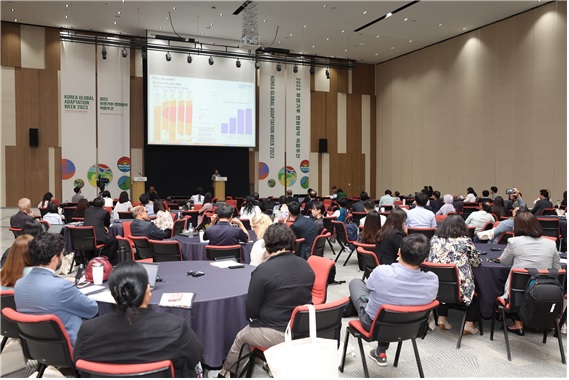
Event venue
A total of 1,000 climate experts and prominent figures from global organizations participated, representing 66 countries. Notable attendees included Inger Andersen, Under-Secretary-General of the United Nations and Executive Director of the UNEP; Majid Al Suwaidi, UNFCCC COP28 Director-General Ambassador; Youssef Nassef, Director of the Adaptation Programme at the UNFCCC; Harry Vreuls, Chair of the UNFCCC Subsidiary Body for Scientific and Technological Advice (SBSTA); and Nabeel Munir, Chair of the UNFCCC Subsidiary Body for Implementation (SBI). During the event, these participants advocated for the establishment and implementation of adaptation plans, assessed the progress of the Global Goal on Adaptation (GGA), and shared specific knowledge relevant to supporting the implementation of national-level adaptation plans.
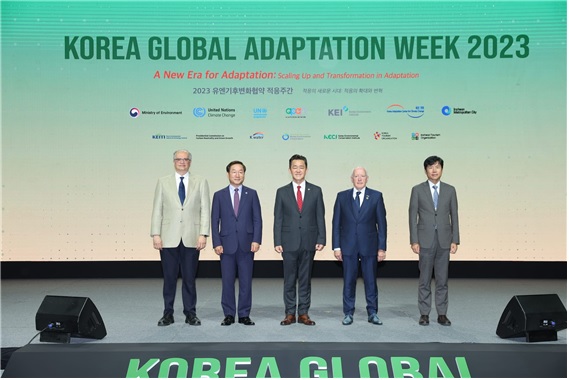
From left to right: Youssef Nassef, Director of the Adaptation Programme at the UNFCCC; Jeong-bok Yoo, Mayor of Incheon; Sang-jun Lim, Vice Minister of the Ministry of Environment; Harry Vreuls, Chair of UNFCCC SBSTA, and Chang Hoon Lee, KEI President.
In his congratulatory remarks, KEI President Chang Hoon Lee introduced KEI’s diverse initiatives in greenhouse gas reductions and climate change adaptation. For future research, he underscored the need for in-depth global-level discussions, with a particular focus on ‘cities,’ as urban areas both contribute to climate change and are disproportionately affected by its impacts.
The main events included the Regional NAP Expo for Asia and the Pacific, organized by UNFCCC, and the 8th Asia-Pacific Climate Change Adaptation Forum, organized by UNEP.
KACCC Director-General Huicheul Jung delivered a presentation titled “A Science-based Climate Change Assessment for Supporting Establishment of Adaptation Plan in Korea” at the Asia NAP Expo on Tuesday, August 29. Dr. Jiyoung Shin, a Senior Research Fellow at KACCC, presented on “Engaging Multi-stakeholder Perspectives in the NAP Process.”
The 8th Asia-Pacific Climate Change Adaptation Forum, which took place from August 30 to September 1, drew a total of 300 participants. This forum stands as UNEP’s largest international conference dedicated to adaptation and serves as a collaborative platform for devising tangible solutions for climate challenges. A diverse array of practitioners, including scientists, financial institutions, community members, and international agencies, convene to exchange experiences and collaboratively address climate issues.
This year’s forum, titled “Resilience for All: Enabling Transformative Implementation,” had the goal of offering sights into adaptation issues and policies to enhance effective planning. It provided reports on the measures taken and progress made in closing the knowledge, policy, and funding gaps since the previous forum. The event also featured practice guidelines for local communities, practitioners, and policymakers, and presented recommendations aimed at strengthening adaptation efforts in the Asia-Pacific regions.
Dr. Hoon Chang, a Chief Research Fellow, along with Dr. Jiyoung Shin and Dr. Youngil Song, who is also a Chief Research Fellow at KEI KACCC, actively participated in the forum. Dr. Chang chaired the session titled “Effective Governance System to Bridge National and Local Governments in Adaptation to Climate Change” on Wednesday, August 30. Dr. Song led the session on “Supportive Tools and Its Application for Climate Change Adaptation Planning,” and delivered a presentation titled “Development of Integrated Model for Climate Change Impacts” during the same session. Additionally, Dr. Song presented on “MOTIVE: Model Of Integrated Impact and Vulnerability Evaluation of Climate Change” in the session titled “Empowering Climate Resilience: Challenges and Opportunities of Practicing Transformative Adaptation through Decentralized Programs and Partner Collaborations,” organized by the Ministry of Environment of Japan and the Secretariat of the Pacific Regional Environment Programme (SPREP).
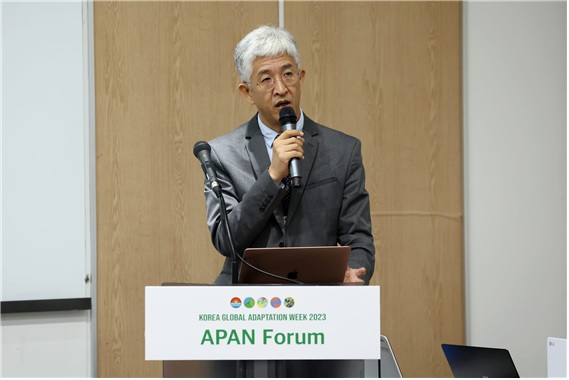
Dr. Hoon Chang, KEI Chief Research Fellow.
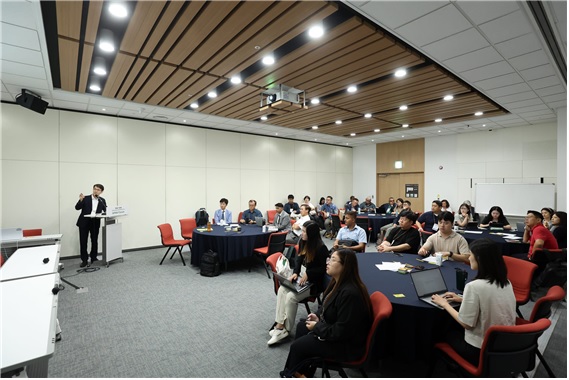
Dr. Youngil Song, KEI Chief Research Fellow, delivering a presentation.
On September 1, the meeting of chairs took place, with the participation of KEI President Chang Hoon Lee, UNEP Executive Director Inger Andersen, and Dechen Tsering, Regional Director of UNEP Regional Office of Asia and the Pacific (ROAP). During this meeting, Executive Director Andersen expressed her aspirations for collaboration between UNEP and KEI in various critical fields, including the global agreement to combat plastic pollution led by UNEP, biodiversity preservation, air quality improvement, and responding to climate crisis. KEI President Lee reciprocated by expressing his pleasure at co-hosting KGAW 2023, building upon the 2019 event. He emphasized the long-standing and productive relationship between UNEP and KEI, spanning numerous fields, including various projects, report publications, and the organization of international events, which has endured for more than two decades. President Lee proposed continued collaboration, rooted in the specialized expertise and research areas that each institution excels in.
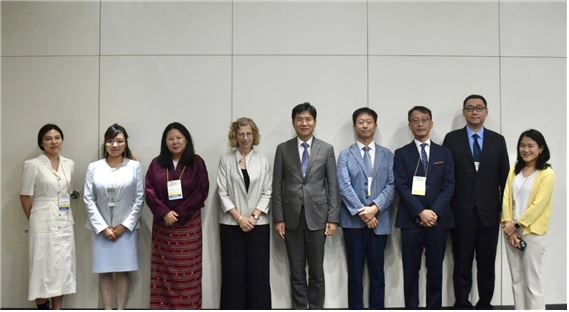
From left to right: Eunyoung Seo, Technical Consultant of the UNEP ROAP; Mari Nishimura, Special Assistant to the Executive Director of the UNEP; Dechen Tsering, Regional Director of the UNEP ROAP (Regional Office of Asia and the Pacific); Inger Andersen, Executive Director of the UNEP; Chang Hoon Lee, KEI President; Dr. Young-Gun Kim, Director-General of the Climate and Air Quality Research Group at KEI; Dr. Huicheul Jung, Director-General of KEI KACCC; Dr. Sungjin Kim, Head of the Global Cooperation Team at KEI; and Juyoun Kang, Research Specialist at KEI KACCC.
In his remarks at the closing ceremony, KEI President Lee conveyed his profound appreciation for the discussions that unfolded during the event. He underscored the idea that climate change adaptation is no longer solely the domain of experts but a matter of concern for all community members. He also expressed his belief that each participating country would be empowered to “usher in the New Era for Adaptation” by leveraging the knowledge and experiences gained at KGAW 2023.
- PrevKEI Co-Hosted Trans-Pacific Sustainability Dialogue 2023
- NextList of Articles by KEI Scholars Published in the Journals Indexed in SCIE/SSCI (updated in August 2..
